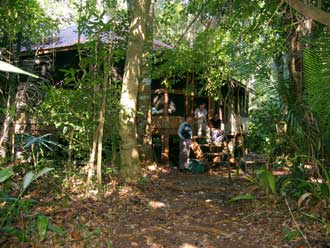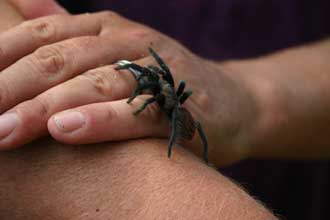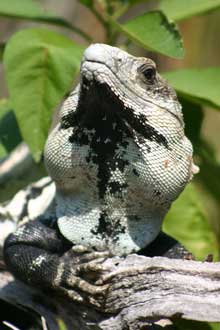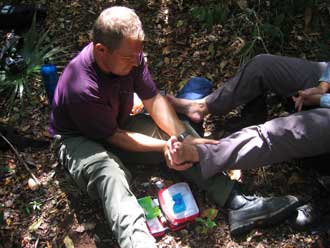Life with a parked bike. February 2005
It hasn't been too long since our last update but it feels like a lot longer than it actually is since we temporarily parked the bike up, adapting to being in one place for a while has taken a bit of effort. No longer getting up every morning and packing our gear onto the bike to ride off round the next unknown bend feels odd. Instead we find ourselves planning a different form of logistics for each day. Are the machetes sharp? Is GPS working and will we be able to carry enough water for our next foray into the jungle? Its now the dry season in Belize and the tropical steam jungles we find ourselves in are less than steamy. We've just returned from a week in the jungle surveying a biological corridor and the little fresh water that remains on the ground is stagnant and full of animal urine. As such, Liz, myself and Anna (a tropical tree specialist and researcher) have had to carry all our water with us. Even though we travelled at an easy pace so we could record all that we saw, the 15 kilometres (9 miles) per day was grueling, hot and painful work. Cutting our way through the jungle, crawling under fallen trees and avoiding the numerous Black Poisonwoods (trees with sap like acid that leaves painful burns) kept us busy all day long, on top of doing the job we were there for. The scenery was spectacular though and made any of the hardships well worth the suffering.


Walking through forests of palms, strangler-figs, mahogany and gumbalimbo trees, to mention but a few, and the chance encounters with tapirs, anteaters, deer, peccary and snakes, to mention but a few more, had us smiling all the way.


Camping in the jungle is a surreal experience. Gone are the noises of humankind, replaced by the din of insects and animals going about their timeless business. The street lights are replaced by stars and household smells are exchanged for the sweet perfume of hot leaves and colourful flowers.

Even conversation changes. At one time for us it would have been the norm to be talking about what was on TV or something but during our trek through the jungle our conversations turned to the colour of our urine and dehydration, chaffing and crotch-rot, blisters, bites and bowels.

The basic fundamentals of life are what becomes important and there's no room for pride or embarrassment. Its a humbling place where the important things in life come back into focus. Its only now that we've come back out of the jungle that we realise that we've been living by sight, sound and smell more so than we ever have before. An example being, having seen and heard nothing at first, we can smell the jaguar den and know we need to be careful. A few metres on and we see the den and all the signs are there that somebody's at home with the kids. We beat a hasty retreat and find another way. Further on and through the cacophony of insect and bird sounds we filter out the distinct sound of white-lipped peccary clacking their tusks in warning, then we smell them. We look for options - escape routes, trees to climb if they charge and ultimately another way round. White-lipped peccary are one of the most aggressive off all the jungles creatures and if they feel the need to protect their young the males will form a defensive front line ahead of the rest of the group. Sometimes numbering as many as 100 in a group its no time to stand your ground - and we didn't. Its rare that a full on attack comes but we choose discretion over valor anyway and nothing happens so on we go.
As odd as it may sound, for the first time on our trip we've really had the time to just sit beside some isolated pond and watch the comings and goings of the wildlife with camera in hand. So much of our trip has been governed by daily jobs and getting from A to B, paper work and finding food, its actually been a nice change to really get away from the bike for a while and REALLY get to know a place, even if it is bereft of people for the most part. Having said that, the people of the area are varied in both culture and even time. The Belizean descendants of the Maya are similar in looks to their Southern Mexico neighbors but different in attitudes. More active in the mind but less active in the body in many ways. Politics is everything to everyone while family comes second to making families! The national radio station is "Love FM" which says it all. On the flip side there's the Mennonite communities of Belize who live a life of odd contrasts to both others and themselves. Using 1880 as a benchmark for the degree to which they feel comfortable with modernization (1880 being the onset of the Industrial Revolution) they have shunned TV, cars and washing machines but are happy to hire taxis, use pesticides and herbicides and modern tractors. Mennonites seem to be in a permanently confused state of denial and acceptance.
Now back at base we're nursing our blisters, bites and cuts, and reminiscing over the sights and experiences of the past few days with copious amounts of beer. (Still trying to get over the dehydration!) Thoughts now go to our next trip over to San Pedro on Ambergris Caye. Only a couple of weeks ago but feeling like light-years back we had a relaxing 4 days there. San Pedro is a small fishing town, now reaping the tourist benefits of being situated on the Belizean Barrier Reef. Its a staging post for anyone who loves the water. Diving, snorkeling, fishing, sailing - take your pick. Not being divers, we plumbed for a snorkeling trip to Shark Ray Alley and Hol Chan. Shark Ray Alley is as the name suggests, full of sharks and sting rays. Historically the area, now a marine reserve was where the fishing boats used to stop off the caye to clean and fillet their catch. Over the years, as tons of fish guts were thrown overboard the sharks and sting rays learnt to hang out there for a free meal and never left. Knowing that there's an easier meal to be had from the dead fish that the live divers and snorkelers they let people swim amongst them unmolested. As soon as we put our heads under the water we were thrown into a world ruled by 10 foot nurse-sharks and sting rays looking like bombers on their way to sortie. They're so tame you can (carefully) hold them and they don't bother. A nurse-shark can suck a conch right out of its shell so its a good idea to keep away from the business end of things though. As soon as the sharks feel they've had enough of the tourists they just shoot off into the distance like lightening with a couple of sweeps of their tails. Its easy to see why man doesn't stand a chance against the more aggressive species of sharks in the water round Belize if they feel the urge. As far as is known though, there's never been a shark attack on a diver in Belize and people swim with the sharks every day so the odds of a safe dive were in our favor .We swam around with them for 45 minutes before moving on to Hol Chan dive site. A natural break in the reef it's like flying through a gorge of other-world trees in multicolour with birds bereft of feathers and wings flying along side you. The sides of the underwater gorge slope steeply down a hundred feet or more and every step of the way a different corral, fish or crustacean takes up its place in the ecosystem. Taking a deep breath and propelling ourselves down with our flippers we swam as far down as our lungs and ears would allow to spend a few snatched seconds with the creatures down there. The seconds feel like minutes until we look up at the surface 40 feet above and kick hard to reach the sky again. We drift horizontally with the current and swim vertically with the gorge walls and its all over all too soon. We're back in the boat and drinking a refreshing fruit punch before we know it. Our minds tell us we've only just got in the water but we stand corrected by our muscles telling us its been another 45 minutes. Soon we'll be doing it all again and it can't come too soon.
